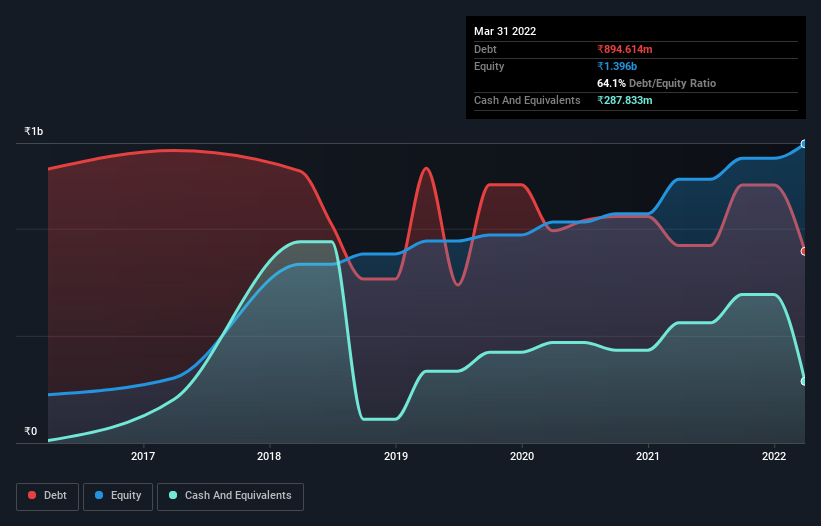
Some say volatility, rather than debt, is the best way to think about risk as an investor, but Warren Buffett famously said that 'Volatility is far from synonymous with risk.' It's only natural to consider a company's balance sheet when you examine how risky it is, since debt is often involved when a business collapses. Importantly, KBC Global Limited (NSE:KBCGLOBAL) does carry debt. But the more important question is: how much risk is that debt creating?
When Is Debt Dangerous?
Debt is a tool to help businesses grow, but if a business is incapable of paying off its lenders, then it exists at their mercy. If things get really bad, the lenders can take control of the business. However, a more usual (but still expensive) situation is where a company must dilute shareholders at a cheap share price simply to get debt under control. By replacing dilution, though, debt can be an extremely good tool for businesses that need capital to invest in growth at high rates of return. When we think about a company's use of debt, we first look at cash and debt together.
View our latest analysis for KBC Global
How Much Debt Does KBC Global Carry?
As you can see below, KBC Global had ₹894.6m of debt, at March 2022, which is about the same as the year before. You can click the chart for greater detail. However, it also had ₹287.8m in cash, and so its net debt is ₹606.8m.

How Strong Is KBC Global's Balance Sheet?
The latest balance sheet data shows that KBC Global had liabilities of ₹771.9m due within a year, and liabilities of ₹1.10b falling due after that. Offsetting this, it had ₹287.8m in cash and ₹1.01b in receivables that were due within 12 months. So its liabilities outweigh the sum of its cash and (near-term) receivables by ₹576.4m.
This deficit isn't so bad because KBC Global is worth ₹2.00b, and thus could probably raise enough capital to shore up its balance sheet, if the need arose. However, it is still worthwhile taking a close look at its ability to pay off debt.
In order to size up a company's debt relative to its earnings, we calculate its net debt divided by its earnings before interest, tax, depreciation, and amortization (EBITDA) and its earnings before interest and tax (EBIT) divided by its interest expense (its interest cover). Thus we consider debt relative to earnings both with and without depreciation and amortization expenses.
While KBC Global has a quite reasonable net debt to EBITDA multiple of 2.1, its interest cover seems weak, at 2.0. This does have us wondering if the company pays high interest because it is considered risky. In any case, it's safe to say the company has meaningful debt. The bad news is that KBC Global saw its EBIT decline by 18% over the last year. If earnings continue to decline at that rate then handling the debt will be more difficult than taking three children under 5 to a fancy pants restaurant. There's no doubt that we learn most about debt from the balance sheet. But it is KBC Global's earnings that will influence how the balance sheet holds up in the future. So when considering debt, it's definitely worth looking at the earnings trend. Click here for an interactive snapshot.
Finally, a company can only pay off debt with cold hard cash, not accounting profits. So it's worth checking how much of that EBIT is backed by free cash flow. During the last three years, KBC Global produced sturdy free cash flow equating to 65% of its EBIT, about what we'd expect. This cold hard cash means it can reduce its debt when it wants to.
Our View
Both KBC Global's EBIT growth rate and its interest cover were discouraging. But its not so bad at converting EBIT to free cash flow. Taking the abovementioned factors together we do think KBC Global's debt poses some risks to the business. So while that leverage does boost returns on equity, we wouldn't really want to see it increase from here. There's no doubt that we learn most about debt from the balance sheet. But ultimately, every company can contain risks that exist outside of the balance sheet. These risks can be hard to spot. Every company has them, and we've spotted 4 warning signs for KBC Global (of which 3 shouldn't be ignored!) you should know about.
When all is said and done, sometimes its easier to focus on companies that don't even need debt. Readers can access a list of growth stocks with zero net debt 100% free, right now.
Valuation is complex, but we're here to simplify it.
Discover if KBC Global might be undervalued or overvalued with our detailed analysis, featuring fair value estimates, potential risks, dividends, insider trades, and its financial condition.
Access Free AnalysisHave feedback on this article? Concerned about the content? Get in touch with us directly. Alternatively, email editorial-team (at) simplywallst.com.
This article by Simply Wall St is general in nature. We provide commentary based on historical data and analyst forecasts only using an unbiased methodology and our articles are not intended to be financial advice. It does not constitute a recommendation to buy or sell any stock, and does not take account of your objectives, or your financial situation. We aim to bring you long-term focused analysis driven by fundamental data. Note that our analysis may not factor in the latest price-sensitive company announcements or qualitative material. Simply Wall St has no position in any stocks mentioned.
About NSEI:KBCGLOBAL
KBC Global
Engages in the real estate construction, development, civil contracts, and other related activities in India.
Excellent balance sheet slight.
Similar Companies
Market Insights
Community Narratives



